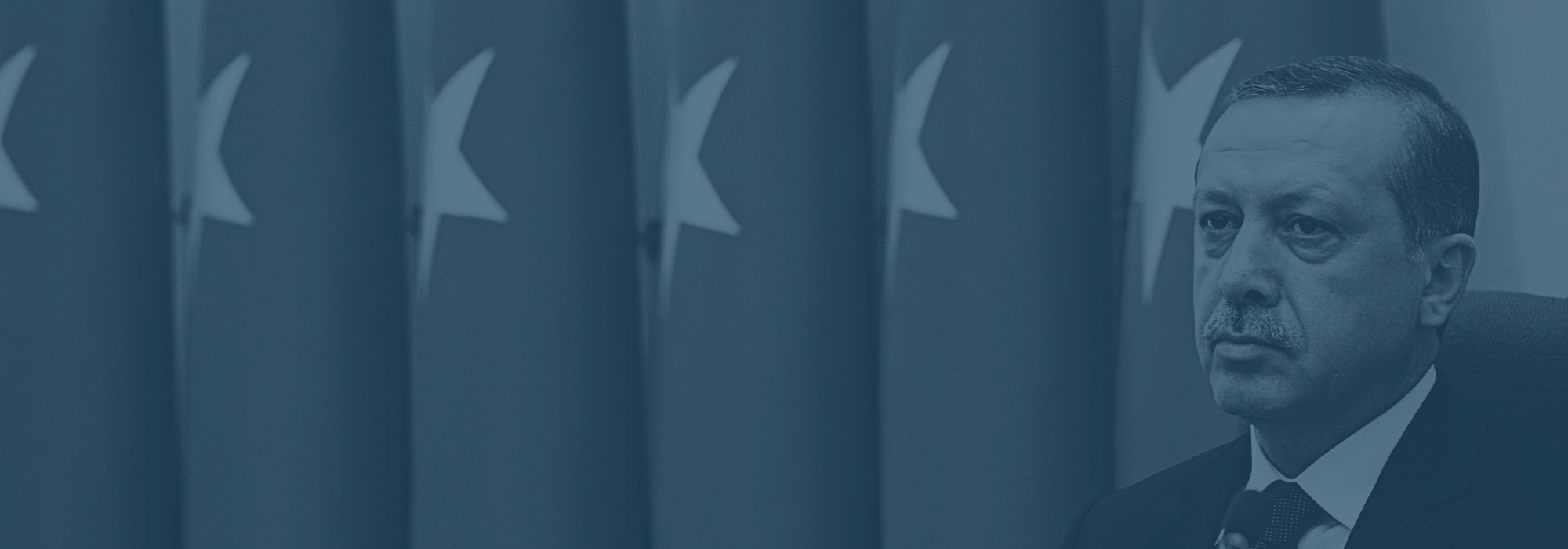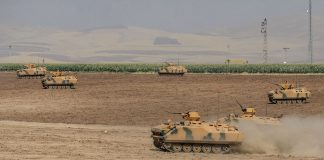Turkey and the United States have agreed to conduct a “joint operation” along Ankara’s borders with Syria, Turkey’s Foreign Minister Feridun Sinirlioglu told the country’s leading daily Hurriyet. The paper quoted unnamed military and diplomatic sources as saying that this effort marked the beginning of the previously announced plans to establish an “ISIL-free zone.” The move that is expected to commence soon involves “a cleaning operation” that will be carried out within a 98-kilomtere long zone in what is known as the Mare-Jarablus line. The joint Turkish-American campaign would offer air protection to Free Syrian Army forces who will launch a ground offensive against the Islamic State group. However, the Turkish army would not put boots on the ground, according to officials. They would strike against IS fighters along the Turkish-Syrian frontier and from the Turkish side of the border.
Despite the fact that the situation on their southern flank continues to deteriorate, the Turks have long been avoiding military intervention in Syria and for many good reasons. Being the region’s largest military and economic power and with the longest border with the war-torn Levantine country, the Turks are well aware that the world is expecting Ankara to do the heavy-lifting to bring order to the chaos that continues to worsen in Syria. Indeed, the United States’ strategy depends on Turkey to take the lead and now in the aftermath of the Nov. 13 Paris attacks, the pressure on the Turkish government has increased exponentially. From their point of view, the Turks do not want to be the global vanguard against IS as they know that once all is said and done the rest of the world will go home leaving them behind to manage the mess for decades to come.
Moreover, the world is worried about IS but for the Turks, the group – though extremely important – is one of many challenges that they will have to deal with over the long haul. The Turks have to figure out how to neutralize IS and in the process not empower Syrian Kurds given Ankara’s imperative to contain Kurdish separatism. Any gains the Kurds make in Syria and Iraq could embolden their brethren in Turkey to increase resistance. It is this conundrum that has held back the Turks from aggressively pursuing their goal of toppling the regime of Bashar al-Assad. But the list of issues arresting Turkey’s forward movement is much longer than simply the concerns about IS and the Kurds.
Intervening in Syria will bring Turkey into direct confrontation with Iran, which is forced by its own imperative to prevent the collapse of the Assad regime. Here is where the Iranians have a head start because they have been involved in Syria for a very long time. In many ways, Iran is blocking Turkey from projecting power into the Arab world because of Tehran’s significant presence in Syria and Iraq – the two Arab states with which Turkey has borders. Greatly amplifying the problem posed by Iranian support for the Assad regime is Russia’s decision to militarily intervene in Syria. Confronting Iran itself is not an easy task for Turkey but the Russians jumping into the fray takes the problem to a whole different level.
Perhaps the biggest challenge for the Turks is that they do not have any good options when it comes to supporting Syrian Arab forces on the ground. IS is the biggest such force but the non-IS rebels are also mostly Salafist-jihadists of varying stripes and on top of that they are heavily aligned with al-Qaida’s Syrian branch, Jabhat al-Nusra. These non-IS rebel forces, to varying degrees, are backed by the region’s Arab players – Saudi Arabia, Qatar, the UAE, and Jordan – whose interests diverge from those of Turkey and have the ability to complicate Turkish moves. The Arab states are only interested in toppling Assad and for this reason they see IS as a force multiplier even though they do not back the movement and actually fear it otherwise. For Turkey, stabilizing a post-Assad Syria is the actual challenge which will be rendered far more problematic given the actions of the Arab states.
Ideally, Turkey’s Islamist-rooted ruling Justice and Development Party would want Muslim Brotherhood-style Islamists to be the dominant Sunni component of a post-Assad Syrian dispensation, who are structured to participate in elections and democratic politics. However, the ground reality is that the Islamist rebels are Salafist-jihadists who oppose democracy and in fact want a caliphate or emirate – even though they oppose the IS polity. Therefore, the international plan to reach a ceasefire within six months, craft a new constitution and hold elections over a two-year period is an extremely ambitious project, to put it really mildly. Given the nature of the rebels and the sectarian logic of the regional conflict, a cessation of hostilities much less a power-sharing arrangement is highly unlikely.
Thus, the idea of backing the Free Syrian Army or some other “moderate” rebel force is more of what the Turks, the Americans and their European partners hope to have as opposed to what they can have. Likewise, these numerous challenges shape the subjective views of what the Turks would like to do, which is avoid getting entangled in Syria as much as possible. Paradoxically, they also constitute objective geopolitical realities that will compel the Turks to act in Syria because the cost of playing it safe has surpassed the cost of intervening. The Turks know that they cannot avoid going into Syria and the question for them is how to move in. This strategy will take time to emerge and it will be gradually implemented.
The Turks know that once they are in Syria, there is no quick coming back. They will be in the Levantine region for the long-term. Syria cannot be stabilized easily but, more importantly, Turkey cannot sit on the sidelines.






 The Geopolitics of the American President
The Geopolitics of the American President